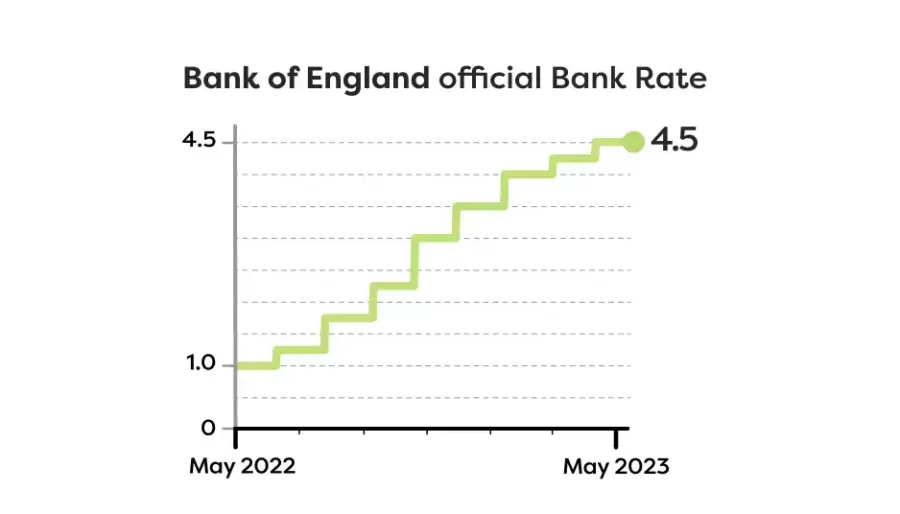Important: This information is for guidance purposes and may become out of date at any given time. It is not investment advice. Investments can rise and fall in value. We won’t make any assessment of whether the investments you choose are appropriate or suitable for you. If you are unsure of the suitability of any investment, investment service or strategy, you should seek independent financial advice. Past performance is not a reliable indicator of future results. Capital is at risk.
What do high interest rates mean for my money?
There’s a good chance that question is on your mind. UK interest rates hit 4.5% in May 2023 – their highest level since 2008 – with some suggesting rates could reach 5% before the end of the year.
You may have already seen the impact of rising rates on your finances – the Bank of England has consistently been raising rates since December 2021.
If you’re still unsure what this means, however, we’ve rounded up how you might be affected below.
Borrowing
Put simply, higher interest rates make borrowing more expensive.
The Bank of England previously said roughly four million UK households faced higher mortgage payments in 2023.
If you have borrowed money, it’s possible the interest on repayments has increased. For example, the Bank of England previously said roughly four million UK households faced higher mortgage payments in 2023.
Additionally, you may also see interest payments due on credit cards and overdrafts rise. That means it costs more to pay off debt.

Saving
Higher interest rates, however, are good for savers. If your bank passes on interest rate rises to you, then you’ll be paid more interest on your savings. Rising rates also offer an opportunity to shop around and see if other banks offer more interest than you’re currently earning.
Even if you’re earning more than 4% on your cash holdings, inflation has been above 10% in 2023.
This is obviously a positive but comes with a caveat – as high as interest rates are, they aren’t as high as the rate of inflation.
Even if you’re earning more than 4% on your cash holdings, inflation has been above 10% in 2023.
The Economy
The Bank of England has been hiking rates to tackle potentially damaging inflation and the rising cost of living. But, if rates rise too high or too quickly, they can also hurt the economy.
For example, if the cost of borrowing money is too great for companies, they may not invest in expanding their businesses. Additionally, consumers may buy less if the cost of goods is high and if they are concerned about credit card repayments becoming too dear.
As businesses and consumers grow cautious with their spending, the central bank must carefully balance the need to raise rates with the potential negative impact to the overall economy.
Investing
Lastly, how does all this relate to your investments? Generally, higher rates are bad news for stocks.
If you want a geeky explanation here, this is largely due to rising rates and their effect on companies’ future cash flows. Higher rates mean these cash flows are worth less today. As a result, investors aren’t willing to pay as much for shares.
High interest rates can also impact companies both positively and negatively. A lot depends on their business models.
If you sell cars, for example, you might see business slow down because customers are more reluctant to take out a loan to buy one. On the other hand, if you’re a bank offering mortgages, you might benefit because you can charge higher rates.
Interest rates are one of many factors that move the price of stocks. You can read more here.





